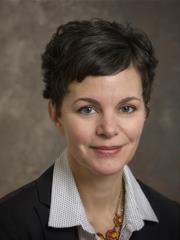On a brutally hot afternoon in Newark, when news outlets were reporting record-breaking heat in the U.S. and Europe; pervasive inflation in the global economy; yet another mass shooting; and the rise of new, more contagious COVID-19 variants, Wendy Bellion observed that humanities majors have never been more needed.
“Humanities programs prepare people for the extraordinary challenges that the world is facing,” said Bellion, the incoming College of Arts and Sciences associate dean for the humanities, effective September 1. “A humanities education creates engaged, active and thoughtful participants in society who are able to contribute meaningfully to the discourse and effect change.”
Despite the dire headlines, Bellion is optimistic that today’s students will, in fact, be the changemakers of tomorrow. “We tend to think that the humanities are just about the past,” said Bellion. “And while it is true that we must study history to understand today’s problems, the humanities also are very much about the future. A humanities education gives us the tools to shape the future we can now only imagine.”
Bellion’s appointment is a reflection of her strong leadership in a number of capacities since she joined UD in 2004. Currently she is a professor in Art History and holds the Sewell C. Biggs Chair in American Art History. She also has served as the director of the Center for Material Culture Studies, the acting director of the Winterthur Program in American Material Culture, and the director of Undergraduate Studies for Art History.
“Wendy will be a tremendous asset to our leadership team and to our college and I am grateful for her willingness to serve in this important role,” said John A. Pelesko, dean of the College of Arts and Sciences.
Prior to UD, Bellion taught at Rutgers University and the College of William and Mary. “The things that drew me to UD and to this college are the things that still excite me,” she said. “It’s an honor to work with intellectually dynamic and inquisitive faculty and students. This college stresses the importance of interdisciplinary partnerships. Humanities initiatives can be transformative for our students and introduce them to career paths they didn’t even realize existed.”
In her new role, Bellion will be responsible for leading an array of units – seven departments, many of which contain graduate programs; four centers, two stand-alone graduate programs and one institute.
Across the humanities, Bellion is interested in advancing diversity and inclusion, including via the University of Delaware Anti-racism Initiative (UDARI), which was launched in the college. She wants to further strengthen the college’s “community of belonging” to ensure that every student feels welcomed and included, in and out of the classroom.
Public engagement with communities statewide also is a high priority for Bellion. She pointed to a summer program that the department of art conservation operates that provides an immersive experience in art conservation to students from historically black colleges and universities. Bellion also has worked with the Choptank Foundation to develop a funded summer internship program for emerging museum professionals at the Biggs Museum of American Art and other Delaware arts institutions. “These programs provide essential career development for humanities majors,” she noted.
Bellion is on the board of the Dover-based Biggs Museum and believes that such outreach is a win-win for the college as well as the community. She is interested in seeing the humanities programs engage more directly with high schools statewide so that Delaware students are exposed to all that the humanities have to offer.
As associate dean, Bellion will continue to actively advise and mentor doctoral candidates. “I love working with Ph.D. students,” she said. “I couldn’t give it up.”
At home, Bellion and her partner, George Irvine, are busy raising two active sons, Luke and Griffin. She plays tennis, cultivates heirloom vegetables in her home garden and travels often with her family.
Yet, despite all that she has on her plate, Bellion exudes an enviable air of serenity. She laughs when asked how she keeps it all together. “If a grad student wants to know the secret to being a good professor, I tell them to take up yoga,” she said. “It gives you peace and centeredness amid everything you’re juggling.”
No doubt as associate dean, Bellion’s yoga mat will continue to be put to good use.
Article by Margo McDonough
Published July 25, 2022




